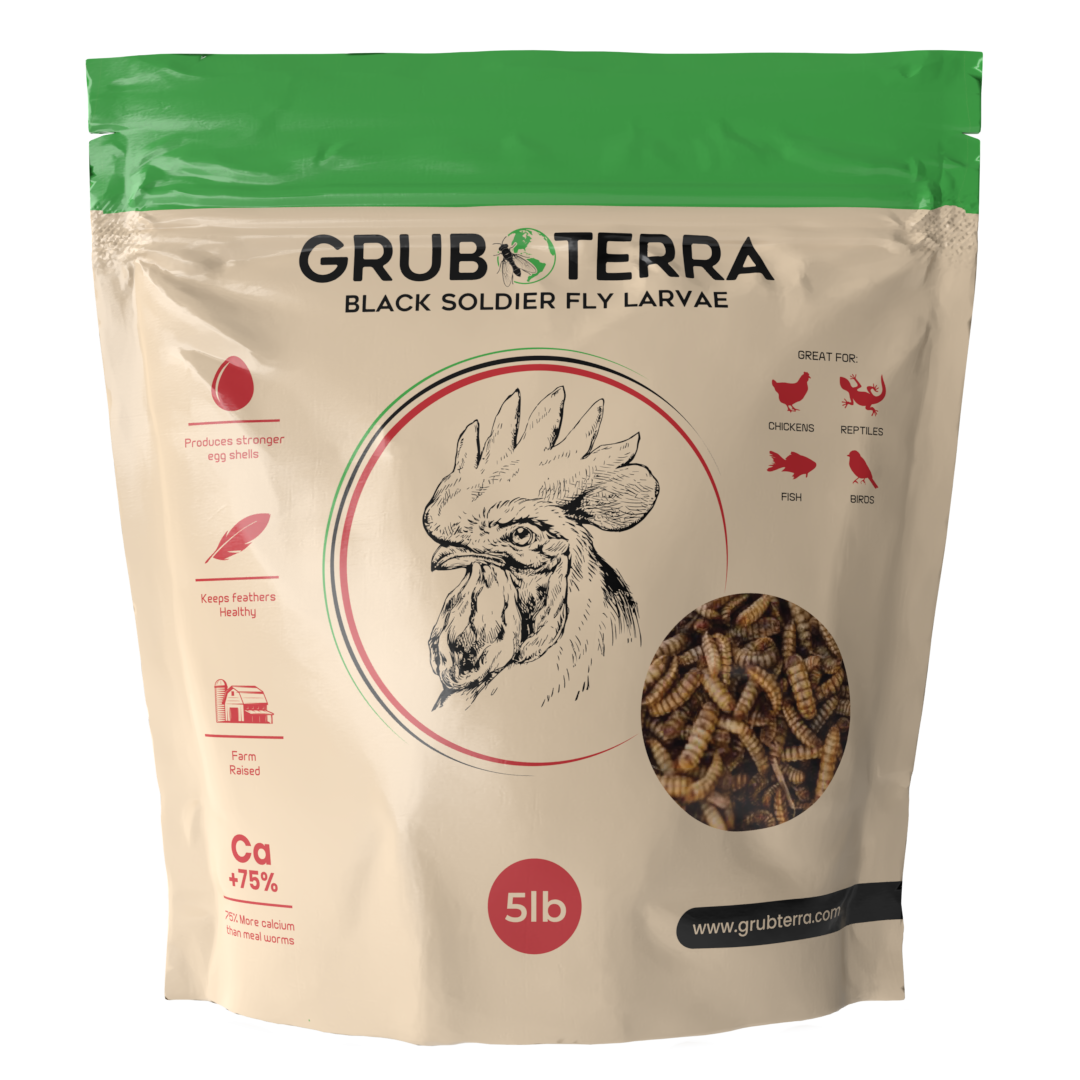Nutrition: The Foundation of Health
The cornerstone of chicken health is nutrition. A balanced diet is not just vital; it's essential. Chickens require a mix of proteins, carbohydrates, fats, vitamins, and minerals to maintain their health and produce quality eggs. Incorporating GrubTerra's 5lb Black Soldier Fly Larvae into their diet can significantly enhance their nutrient intake, offering a natural and sustainable protein source that chickens love.
Clean Water: Essential for Life
Water is the essence of life, and clean, fresh water is non-negotiable for chickens. Ensure they have constant access to water that is changed daily to prevent the spread of diseases and keep them hydrated, especially during the hotter months.

Safe Housing: Protection and Comfort
A secure coop is critical for protecting your chickens from predators and extreme weather conditions. It should be sturdy, well-ventilated, and spacious enough to prevent overcrowding, which can lead to stress and disease.
Regular Health Checks: Prevention is Better Than Cure
Routine health checks can catch potential issues before they become serious. Look out for signs of illness or distress, such as changes in eating habits, lethargy, or abnormal droppings, and consult a veterinarian if necessary.
Parasite Control: Keeping the Flock Pest-Free
Parasites, both internal and external, can wreak havoc on a chicken's health. Regular deworming and treatments for lice and mites are essential to keep your chickens in peak condition.
Stress Reduction: A Happy Chicken is a Healthy Chicken
Stress can significantly impact a chicken's health and egg production. Ensure they have enough space, engage in natural behaviors, and live in a peaceful environment to keep stress levels low.
Exercise: Vital for Vigor
Chickens need to move and forage to maintain their health and well-being. Providing a safe, enclosed space for them to roam can encourage natural behaviors and prevent obesity.
Disease Prevention: A Clean Coop is Key
Maintaining a clean environment is critical to preventing disease. Regular cleaning and disinfecting of the coop and equipment can help minimize the risk of infections spreading.
Vaccination: A Shield Against Illness
Vaccinations can protect chickens from common poultry diseases. Consult with a veterinarian to determine the appropriate vaccination schedule for your flock.

Quarantine New Arrivals: Preventing Disease Spread
Introducing new chickens to your flock can introduce diseases. Quarantining new arrivals for at least two weeks can help ensure they are healthy before mixing with your existing birds.
Community and Support: Learning and Growing Together
Joining a community of fellow poultry enthusiasts can provide valuable support and knowledge. Websites like GrubTerra's blog offer a wealth of information on keeping your chickens healthy and happy.

FAQs
What is the best diet for chickens?
- A balanced diet that includes proteins, grains, and greens, supplemented with high-quality feed like Black Soldier Fly Larvae, ensures optimal health and egg production.
How often should I clean my chicken coop?
- A thorough cleaning should be done at least once a month, with regular spot cleaning to maintain hygiene.
Can chickens get cold?
- Yes, chickens can get cold, especially in extreme winter conditions. Providing a well-insulated coop and proper bedding can help keep them warm.
How do I know if my chicken is sick?
- Signs of sickness include changes in behavior, appetite, and appearance. Regular health checks can help identify issues early.
Is it necessary to vaccinate chickens?
- Vaccination can prevent many common diseases in chickens. Consult with a veterinarian for the best vaccination strategy for your flock.
How can I reduce stress in my chickens?
- Ensuring they have enough space, proper nutrition, and a safe environment can significantly reduce stress levels.
Conclusion
In wrapping up, nurturing a healthy flock requires a blend of dedication, knowledge, and an unwavering commitment to the well-being of our feathered friends. These 11 strategies are not just guidelines but a blueprint for fostering a thriving environment where chickens can flourish. By prioritizing their health, safety, and happiness, we pave the way for a rewarding journey in poultry keeping. It's a journey that not only yields a bounty of fresh eggs but also enriches our lives with joy and a deeper connection to nature. The essence of successful chicken keeping lies in the harmonious balance between their needs and our capacity to fulfill them, creating a sustainable and joyful backyard ecosystem. For more insightful tips and strategies on keeping your chickens healthy, visit GrubTerra's blog.
Moreover, the health of our chickens is a reflection of our attentiveness and care, underscoring the significance of a proactive approach to their well-being. As we implement these proven strategies, we contribute to a positive cycle of health, productivity, and environmental sustainability. The journey of keeping chickens healthy is a testament to the resilience of nature and the impact of compassionate stewardship. Let's embrace this responsibility with optimism and dedication, ensuring that our chickens lead not only healthy but also happy lives. Through this endeavor, we not only nurture our chickens but also cultivate a legacy of sustainability and care for future generations to cherish and continue. Discover the benefits of incorporating GrubTerra's 5lb Black Soldier Fly Larvae into your chickens' diet for optimal health and visit GrubTerra for high-quality poultry products.


